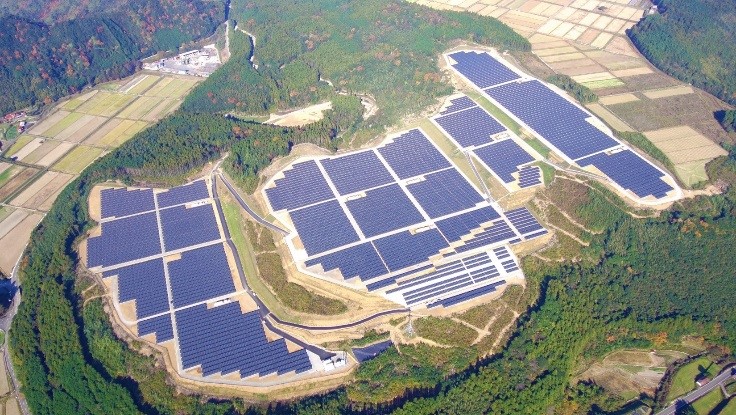Shareholders Kyocera Corporation and Tokyo Century Corporation announced that work on Kyocera TCL Solar’s large-scale solar PV plant has been completed.
Located in Hagi City, in Yamaguchi Prefecture, a total of 78,144 of Kyocera’s modules were installed across roughly 1 km2 of land, which was originally planned for the construction of an industrial waste disposal facility.
The plant is expected to generate an estimated 23,000 MWh of solar electricity annually, which will be sold to local utility, Chugoku Electric Power Co., Inc.
It is Kyocera’s second largest solar power plant in Japan, following the 25 MW plant in Fushimi-ku, Kyoto City, which was built on an abandoned golf course. Overall, since 2012, the company has installed a total of 166.9 MW across 58 plants.
Operations have also begun on five of Kyocera TCL Solar's floating solar PV plants, while construction on what is said to be Japan’s largest such system in terms of output – the 13.7 MW floating solar power plant on a dam reservoir in Chiba Prefecture – has been completed, with operation scheduled for this March.
In an interview for the February edition of pv magazine, Ichiro Ikeda, general manager of Kyocera’s Solar Energy Marketing Division said the company aims to develop around 20 new floating projects in the next three years.
Changing focus
Ikeda added that due to lower feed-in-tariffs (FITs) and fewer sites available, which are suitable for ground mounted utility-scale solar power plants, new project implementation for Kyocera’s power sales business is expected to gradually decrease in the future.
“In response to this, Kyocera will promote the installation of small- to mid-scale systems for self-consumption. Currently, with the goal of expanding renewable energy use, the government is also working to promote operation & maintenance (O&M) of solar power plants, and we are also strengthening our O&M businesses in response to this trend,” said Ikeda.
Popular content
He continued, “In addition, we are promoting installation of systems for self-consumption by effectively using unused sites such as within factory premises, on factory rooftops and on carport structures.”
Overall, Ikeda said the company will expand business by using three types of technologies: solar cells, storage batteries and fuel cells. “As there are not so many companies that are capable of producing these three items, we aim to differentiate ourselves by offering solutions that utilize our line of environmental energy products,” he said.
Regarding the residential market, Ikeda said the company is working on enhancing its battery storage units to meet Japan's Zero Energy Home (ZEH) standards and expanding business by using AI control systems. “Furthermore, we aim to enable solar energy use which is cheaper than utility electric power by realizing cost reductions through the development of lithium-ion storage batteries,” he said.
Manufacturing
While it does not disclose exact numbers, a spokesperson told pv magazine that in 2017, Kyocera shipped modules equating to approximately 1GW of output capacity.
In terms of its current manufacturing status, the spokseperson said, “Kyocera continually readjusts our production system in view of market trends and, currently, solar module manufacturing is taking place in East Asia, mainly utilizing the plants in Japan, rather than the Czech Republic, San Diego or Mexico facilities.”
Below is an overview of Kyocera’s current PV manufacturing locations:
- Japan: Solar R&D and production began in 1975 and continues
- China: Solar production started in 2002 and continues
- USA: Solar production started in 2010 with the American Recovery and Reinvestment Act for U.S. customers, and moved to Mexico in 2013 as ARRA funds ended
- Czech: Solar production started in 2005 and moved to Asia in 2015
- Mexico: Solar production started in 2004 and moved to Asia in 2016
This content is protected by copyright and may not be reused. If you want to cooperate with us and would like to reuse some of our content, please contact: editors@pv-magazine.com.



1 comment
By submitting this form you agree to pv magazine using your data for the purposes of publishing your comment.
Your personal data will only be disclosed or otherwise transmitted to third parties for the purposes of spam filtering or if this is necessary for technical maintenance of the website. Any other transfer to third parties will not take place unless this is justified on the basis of applicable data protection regulations or if pv magazine is legally obliged to do so.
You may revoke this consent at any time with effect for the future, in which case your personal data will be deleted immediately. Otherwise, your data will be deleted if pv magazine has processed your request or the purpose of data storage is fulfilled.
Further information on data privacy can be found in our Data Protection Policy.